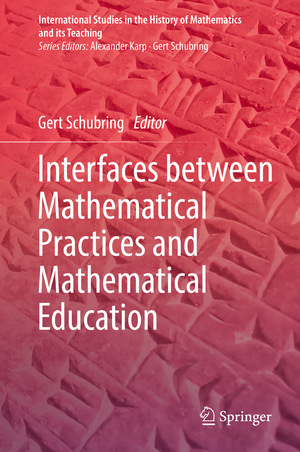Interfaces between Mathematical Practices and Mathematical Education: International Studies in the History of Mathematics and its Teaching
Editat de Gert Schubringen Limba Engleză Hardback – 12 feb 2019
Preț: 782.87 lei
Preț vechi: 954.72 lei
-18% Nou
Puncte Express: 1174
Preț estimativ în valută:
149.80€ • 156.82$ • 123.95£
149.80€ • 156.82$ • 123.95£
Carte tipărită la comandă
Livrare economică 05-19 aprilie
Preluare comenzi: 021 569.72.76
Specificații
ISBN-13: 9783030016166
ISBN-10: 3030016161
Pagini: 221
Ilustrații: XVI, 190 p. 23 illus., 6 illus. in color.
Dimensiuni: 155 x 235 mm
Greutate: 0.47 kg
Ediția:1st ed. 2019
Editura: Springer International Publishing
Colecția Springer
Seria International Studies in the History of Mathematics and its Teaching
Locul publicării:Cham, Switzerland
ISBN-10: 3030016161
Pagini: 221
Ilustrații: XVI, 190 p. 23 illus., 6 illus. in color.
Dimensiuni: 155 x 235 mm
Greutate: 0.47 kg
Ediția:1st ed. 2019
Editura: Springer International Publishing
Colecția Springer
Seria International Studies in the History of Mathematics and its Teaching
Locul publicării:Cham, Switzerland
Cuprins
Introduction.- 1.Foundations of mathematics buried in school garbage (Southern Mesopotamia, early second millennium BCE).- 2. From the practice of explanation to the ideology of demonstration: an informal essay.- 3.Catholicism and Mathematics in the Early Modernity.- 4.“Je n’ai point ambitionnée d’être neuf”: Modern Geometry in Early Nineteenth-Century French Textbooks.- 5.The impact of teaching mathematics upon the development of mathematical practices.- 6.A Multiple Perspective Approach to History of Mathematics: Mathematical programming and Rashevsky’s early development of mathematical biology in the 20th century.- 7.Teaching as an indicator of mathematical practices.
Notă biografică
Gert Schubring is a retired member of the Institut für Didaktik der Mathematik, a research institute at Bielefeld University, and at present is visiting professor at the Universidade Federal do Rio de Janeiro (Brazil). His research interests focus on the history of mathematics and the sciences in the eighteenth and nineteenth centuries and their systemic interrelation with social-cultural systems. One of his specializations is history of mathematics education. He has published several books, among which is Conflicts between Generalization, Rigor and Intuition: Number Concepts Underlying the Development of Analysis in 17th–19th Century France and Germany (New York, 2005).
Textul de pe ultima copertă
This contributed volume investigates the active role of the different contexts of mathematics teaching on the evolution of the practices of mathematical concepts, with particular focus on their foundations. The book aims to deconstruct the strong and generally wide-held conviction that research in mathematics constitutes the only driving force for any progress in the development of mathematics as a field. In compelling and convincing contrast, these chapters aim to show the productive function of teaching, showcasing investigations from countries and regions throughout various eras, from Old Babylonia through the 20th Century. In so doing, they provide a critical reflection on the foundations of mathematics, as well as instigate new research questions, and explore the interfaces between teaching and research.
Caracteristici
Uniquely investigates the teaching of mathematics in different contexts in the evolution of mathematics practice. Argues that the teaching of mathematics has historically been the driving force behind development in the field. Considers a wide range of examples spanning countries, regions, and time periods—from Old Babylonia through the 20th century. Shows that mathematics teaching instigates reflections about the foundations of mathematics and productive interaction with mathematics research.







